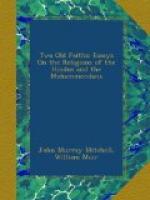[Sidenote: Martial passages from Koran recited on field of battle.] The courage of the troops was stimulated by the divine promises of victory, which were read (and on like occasions still are read) at the head of each column drawn up for battle. Thus, on the field of Cadesiya[d], which decided the fate of Persia, the Sura Jehad, with the stirring tale of the thousand angels that fought on the Prophet’s side at Bedr was recited, and such texts as these:
Stir up the faithful unto battle. If there be twenty steadfast among you they shall put two hundred to flight of the unbelievers, and a hundred shall put to flight a thousand. Victory is from the Lord. He is mighty and wise. I the Lord will cast terror into the hearts of the infidels. Strike off their heads and their fingers’ ends. Beware lest ye turn your back in battle. Verily, he that turneth his back shall draw down upon himself the wrath of God. His abode shall be hell fire; an evil journey thither.
And we are told that on the recital of these verses “the heart of the people was refreshed and their eyes lightened, and they felt the tranquillity that ensueth thereupon.” Three days they fought, and on the morning of the fourth, returning with unabated vigor to the charge, they scattered to the winds the vast host of Persia.[47]
[Sidenote: Defeat of Byzantine army on the Yermuk, A.D. 634.] Nor was it otherwise in the great battle of the Yermuk, which laid Syria at the feet of the Arabs. The virgin vigor of the Saracens was fired by a wild fanatical zeal “to fight in the ways of the Lord,” obtaining thus heavenly merit and a worldly prize—the spoil of Syria and its fair maidens ravished from their homes; or should they fall by the sword, the black-eyed houries waiting for them on the field of battle. “Of warriors nerved by this strange combination of earth and heaven, of the flesh and of the spirit, of the incentives at once of faith and rapine, of fanatical devotion to the prophet and deathless passion for the sex, ten might chase a hundred half-hearted Romans. The forty thousand Moslems were stronger far than the two hundred and forty thousand of the enemy.” The combat lasted for weeks; but at the last the Byzantine force was utterly routed, and thousands hurled in wild confusion over the beetling cliffs of the Yermuk into the yawning chasm of Wacusa.[48]
[Sidenote: Islam planted by aid of material force.] Such, then, was the nature of the Moslem propaganda, such the agency by which the faith was spread, and such the motives at once material and spiritual by which its martial missionaries were inspired. No wonder that the effete empires of Rome and Persia recoiled and quivered at the shock, and that province after province quickly fell under the sway of Islam. It is far from my intention to imply that the truths set forth by the new faith had nothing to do with its success. On the contrary, it may well be admitted that but for those truths success might have




